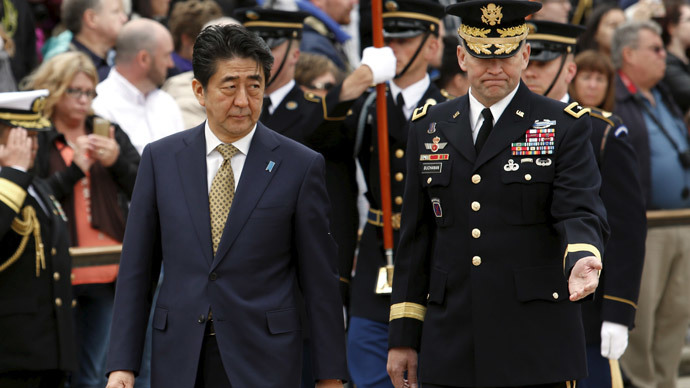'Japan’s most nationalist govt since WWII reinterprets pacifist constitution’

Shinzo Abe’s government reinterpreted Japan’s peaceful constitution without bringing it up for a public referendum as there are many people who are concerned about the militarization of the country, Conn Hallinan of Foreign Policy in Focus told RT.
Prime Minister Shinzo Abe is on a weeklong visit to America. The US and Japan have issued a joint statement on their defense ties. It states that additional missile defense warships will be stationed at an American naval base in Japan by 2017. The US will also provide Tokyo with an advanced nuclear-powered super carrier. Washington says it is willing to defend Japan. All this comes during a territorial dispute between Tokyo and Beijing over the Senkaku islands in the East China Sea.
RT:Washington says it's ready to use all military options, including nuclear weapons, to defend Japan. Is it surprising to hear such extreme scenarios being talked about?
READ MORE: US & Japan unveil new defense policy amid China tensions
Conn Hallinan: I think that this is something that dates back to the original treaty, The San Francisco Treaty of [1951], where the US built in deliberately a whole series of sort of ambiguities. One of them was these controls of the islands in the East China Sea. If you notice that the term they use is that they don’t give Japan ownership, they gave to them “administration”. They keep saying: “We don’t have any position on who holds the island but the Japanese administer them,” and they are willing to back them up, up to an including war. And of course any war with China would certainly raise the possibility of going nuclear. It is very much a part of the [US] Asia pivot, this attempt to encircle China, which it has largely done, and to build up local strategic allies...
RT:In economic terms, China is vital to US interests. Is there a risk that Washington could damage this relationship, with its military expansion in Asia and ties with Japan?
CH: The main thing it does is it raises the military profile of the US in the region and most of all it ties the US very closely with what is the most nationalist, the most aggressive Japanese government since the end of the WWII. That is the part that is worrisome. In a sense Americans’ decision of “war and peace”, those decisions are now being made in Tokyo. We [the US] have essentially given Tokyo a blank check in their relations with China...

RT:Japanese Premier Abe is seen as promoting nationalistic ideals even saying that apologizing for past war-crimes is 'masochistic'. Could this anger Japan's neighbors?
CH: Japan’s neighbors are pretty angry right now…This is a government which has alienated itself particularly from South Korea, China [and] also some of the other countries in the region, Taiwan, for instance, etc.
What people are to be concerned about is that Japan is now building up military forces - they have the fifth largest Navy in the region. But it is how they are talking... You haven’t heard the Japanese talk like this since 1938 or 1939. And that turned out rather badly for all of the parties concerned. I’m very much worried that I’m going to see my country [the US] pulled into a conflict that is not something that we have any basic interest in. This is dispute between China and Japan over the ownership of these islands. We really should not be interfering into it.
RT:Recent polls have found that support for changing Japan's pacifist constitution has dropped in recent years while opposition to changing the document has risen. Are Japan's government and people together on this issue?
READ MORE: China card in Japan’s strive for remilitarization
CH: There is still a significant group of people who are very concerned about [changing] this constitution, which is one of the reasons why the Abe government has not brought it up for a public referendum - they’ve sort of made the changes at a cabinet level, they reinterpreted the constitution at this point.
On the other hand, one of the things the Abe government has done is that it is really crack down on the press and the media. ... The Japanese people are getting a very slanted kind of version of what is going on in their region of the world. After while ... people change their minds. They will begin to say: “Well, the Chinese are a threat, the Americans are friends; the Chinese started all of these, etc.” And the next thing you have people saying: “Maybe we need to be able to defend ourselves, etc.” And Japanese are not alone on this - this is what the media can do on almost anything - it happens to Americans all the time.
MORE:
The statements, views and opinions expressed in this column are solely those of the author and do not necessarily represent those of RT.
The statements, views and opinions expressed in this column are solely those of the author and do not necessarily represent those of RT.












